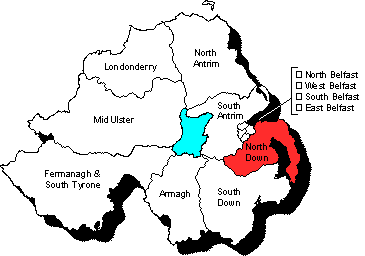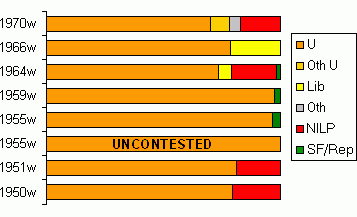

 |

|
|
|
|
|

|

|
| Map and diagram by Conal Kelly | |
This constituency, located south-west of Belfast, covered north-west county Down including the Ards peninsula. Established in 1948, the constituency incorporated much of the old Down two-seat constituency. Between 1950 and 1970 the constituency was represented by four Unionist MPs, all of whom were Unionist. The longest serving of these was George Currie who was first elected in 1955 and continued to represent the constituency until his retirement in 1970. All elections held during this period were contested with the exception of a by-election held in 1953. The declared winner was Unionist nominee Patricia Ford, who did not stand in the subsequent general election in 1955. The constituency recorded the lowest turnout in the 1951, 1955, 1964, 1966 and 1970 general elections.
See also election results for North Down 1973-1982, 1983-1992 and 1993-2007.
| U | Oth U | Lib | NILP | Oth | SF/Rep | |
| 1970w | 69.9% | 8.0% | 17.9% | 4.2% | ||
| 1966w | 78.5% | 17.9% | ||||
| 1964w | 73.5% | 6.2% | 18.9% | 1.4% | ||
| 1959w | 98.0% | 2.0% | ||||
| 1955w | 96.8% | 3.2% | ||||
| 1953w-b | * | |||||
| 1951w | 81.4% | 18.6% | ||||
| 1950w | 79.4% | 20.6% |
* The only candidate nominated for the 1953 By-Election was Unionist Patricia Ford. She was therefore duly elected without a contest.
Unionist majority: 41,433; electorate: 121,196; votes cast: 65.7%
Having represented
North Down for over 15 years, George Currie did not seek re-election in
1970. He was replaced on the ballot by Unionist James Kilfedder. Kilfedder had
been elected as MP for West Belfast in 1964, but had lost
his seat at the 1966 election to Gerry Fitt. On this occasion he faced three
opponents, including Ken Young of the NILP and Independent Ritchie
McGladdery. Robert Nixon, who had represented North Down in the Northern
Ireland House of Commons (1953-1969), was contesting the election as an
Independent Unionist. When the ballots were counted, Kilfedder emerged as
the clear winner with a huge majority of over 41,000.
Kilfedder continued to represent North Down until his death in 1995. Initially
a member of the Unionist Party, he later left and formed the Ulster Popular
Unionist Party.
Unionist majority: 28,124; electorate: 100,755; votes cast: 48.9%
The incumbent Currie
once again defended his seat in the 1966 general election. His sole opponent
was Sheelagh Murnaghan, a barrister and Liberal member of the Northern
Ireland House of Commons for Queens University. Murnaghan had unsuccessfully
contested South Belfast in the 1959 Westminster general election. In the end,
Murnaghan managed to capture some 21.5% of the poll but was not able to
unseat Currie who went on to his fourth term at Westminster.
Sheelagh Murnaghan was the only person to be elected to Stormont as a Liberal
candidate.
Unionist majority: 33,520; electorate: 97,151; votes cast: 63.1%
Currie seeking a
third successive victory faced three new opponents in the 1964 election.
Edward Bell represented the NILP who were contesting the constituency for
the first time since 1951. Rev. Albert McElroy also returned to North
Down after an absence of 13 years but this time as leader of the Liberal
Party. Rounding out the field was Paddy McGrattan who was standing on a
Republican abstentionist ticket (Sinn Fein now being a proscribed
organization). In the end Currie successfully defended his seat, although
his majority was reduced to 33,520.
Bell also stood unsuccessfully for the Northern Ireland House of Commons
in the general elections of 1958 (Belfast Bloomfield) and 1965 (Ards).
McElroy also stood unsuccessfully for the Northern Ireland House of Commons
in 1958 (Queens University), 1962 (Ards), 1965 (Enniskillen) and 1966
(Queens University).
Unionist majority: 50,734; electorate: 89,886; votes cast: 58.8%
In a repeat of the 1955 general election, the incumbent Currie again faced his Sinn Fein opponent Joseph Campbell. Currie once again topped the poll and managed to increase his majority to over 50,000, the largest in Northern Ireland.
Unionist majority: 48,678; electorate: 84,968; votes cast: 61.1%
The incumbent Patricia Ford, who had been elected in the 1953 by-election, did not seek re-election in 1955. She had got off to a bad start with an irreverent newspaper column about the House of Commons, which went down so badly that her maiden speech had to be an apology; she was also expelled from the Orange Order for attending a requiem mass at Brompton Oratory.
She was replaced on the ticket by Unionist George Currie. Currie, a
barrister, had unsuccessfully contested East Flintshire in North Wales for
the Conservatives in 1950 and 1951. His sole opponent on this occasion was
Joseph Campbell of Sinn Fein. The result, never in any doubt, was a clear
victory for Currie who achieved a massive majority of over 48,000.
Currie had previously been elected to Wirral County Borough Council and served
as Chairman of the Council in 1938-39.
Unopposed Unionist Candidate.
This by-election was caused by the tragic death of the incumbent Sir Walter Dorling Smiles. He died with 151 others in the sinking of the Princess Victoria ferry in the great storm of January 1953. In the resulting by-election, his daughter Patricia Ford was nominated as the Unionist candidate. As the sole nominee she was duly elected without a contest. Ford was the first female Unionist MP and was the first woman to take her seat in the House of Commons from Ireland.
Unionist majority: 33,371; electorate: 80,921; votes cast: 65.7%
In a repeat of the 1950 general election, the incumbent Smiles again faced his NILP opponent Albert McElroy. Smiles once again topped the poll and managed to increase his majority to over 33,000. This was the Unionist Party's best result of the election.
Unionist majority: 30,974; electorate: 77,316; votes cast: 68.1%
The 1950 general
election saw the elimination of the Down two-seat constituency which was
replaced by North Down and South Down. Sir Walter Smiles was one of
the two Unionist MPs elected for Down in 1945 and was selected to contest
the new North Down constituency. His sole opponent was Albert McElroy, on
this occasion representing the NILP. The result was a very clear victory
for Smiles, romping home with a majority in excess of 30,000.
Smiles had previously been elected to the House of Commons in 1931 as the
Conservative MP for Blackburn, Lancashire. Labour MP Barbara Castle was
also returned for the same two-seat constituency. The radical Rev. Albert
McElroy had stood unsuccessfully for the Northern Ireland House of Commons
in the 1945 general election for the constituency of Ards under the
Commonwealth Labour Party banner. He would also later leave the NILP and
join the Liberal Party.
See also:
Results from 1950 to 1970 for each seat: East Belfast | North Belfast | South Belfast | West Belfast | North Antrim | South Antrim | Armagh | North Down | South Down | Fermanagh and South Tyrone | Londonderry | Mid Ulster
Other sites based at ARK: ORB (Online Research Bank) | CAIN (Conflict Archive on the INternet) | Northern Ireland Life and Times Survey
Your comments, please! Send an email to me at nicholas.whyte@gmail.com.
Conal Kelly, 1 June 2007.
|
Disclaimer:©
Nicholas Whyte 1998-2004 Last Updated on Wednesday, 12-Jan-2005 12:12
|